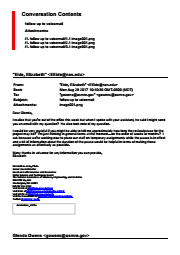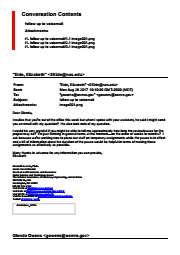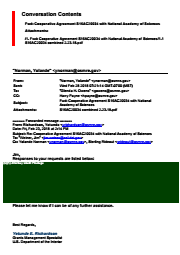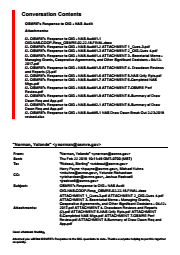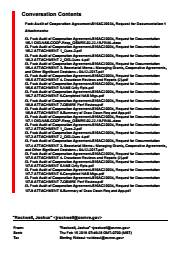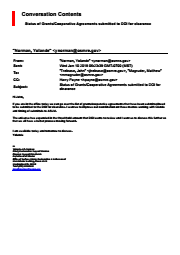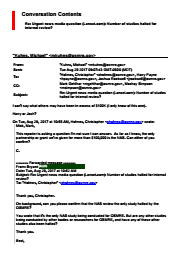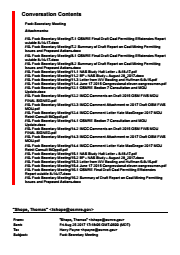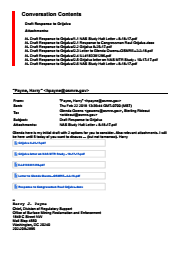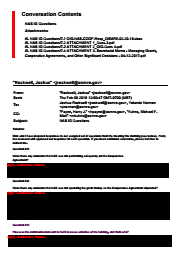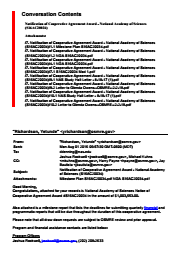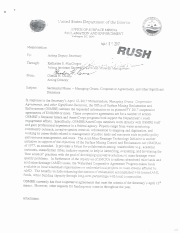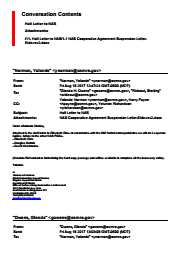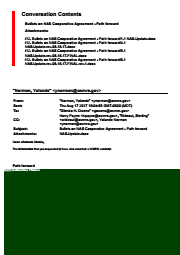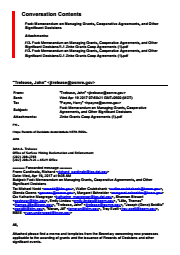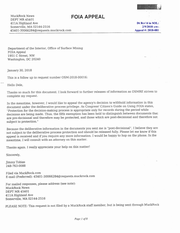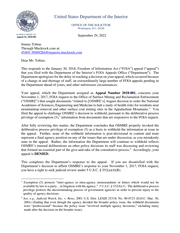MTR Study Cancellation II
| Tracking # |
2018-081 OSM-2018-00016 |
| Submitted | Nov. 1, 2017 |
MuckRock users can file, duplicate, track, and share public records requests like this one. Learn more.
Communications
From: Jimmy Tobias
To Whom It May Concern:
This is a request under the Freedom of Information Act. I hereby request the following records:
All documents and correspondence related to the Office of Surface Mining Reclamation and Enforcement's August decision to order the National Academies of Sciences, Engineering and Medicine to halt a study of health risks for residents near mountaintop removal and other surface coal mining sites in the Appalachian Mountains. This requests pertains to documents and correspondence produced between January 20, 2017 and the date this request is processed.
I am a reporter for The Nation magazine and the requested documents will be made available to the general public. This request is not being made for commercial purposes.
In the event that there are fees, I would be grateful if you would inform me of the total charges in advance of fulfilling my request. I would prefer the request filled electronically, by e-mail attachment if available or CD-ROM if not.
Thank you in advance for your anticipated cooperation in this matter. I look forward to receiving your response to this request within 20 business days, as the statute requires.
Sincerely,
Jimmy Tobias
From: Muckrock Staff
To Whom It May Concern:
I wanted to follow up on the following Freedom of Information request, copied below, and originally submitted on Nov. 1, 2017. Please let me know when I can expect to receive a response, or if further clarification is needed.
Thanks for your help, and let me know if further clarification is needed.
From: Muckrock Staff
To Whom It May Concern:
I wanted to follow up on the following Freedom of Information request, copied below, and originally submitted on Nov. 1, 2017. Please let me know when I can expect to receive a response, or if further clarification is needed.
Thanks for your help, and let me know if further clarification is needed.
From: Department of the Interior, Office of Surface Mining
Dear Mr. Tobias:
We apologize for the delay in responding to your request. The Office of
Surface Mining Reclamation and Enforcement (OSMRE) received your FOIA
request dated November 1, 2017, and assigned it control number
*OSM-2018-00016*. Please cite this number in any future communications
with our office regarding your request.
We have classified you as a “media-use” requester. As such, we may charge
you for some of our duplication costs, but we will not charge you for our
search or review costs; you also are entitled to up to 100 pages of
photocopies (or an equivalent volume) for free. *See **43 C.F.R. § 2.39*
<http://www.ecfr.gov/cgi-bin/text-idx?c=ecfr&sid=0fc3ab3499768eebc2e3691c8cf88dec&rgn=div5&view=text&node=43:1.1.1.1.2&idno=43#43:1.1.1.1.2.7.5.3>.
If, after taking into consideration your fee category entitlements, our
processing costs are less than $50.00, we will not bill you because the
cost of collection would be greater than the fee collected. *See **43
C.F.R. § 2.37(g)*
<http://www.ecfr.gov/cgi-bin/text-idx?c=ecfr&sid=0fc3ab3499768eebc2e3691c8cf88dec&rgn=div5&view=text&node=43:1.1.1.1.2&idno=43#43:1.1.1.1.2.7.5.13>
Please be informed that we are conducting responsive records search based
on the subject matter of your request. Please expect to hear from us
following the completion of our records search. Because we will need to
consult with one or more offices of the Department in order to properly
process your request, we are placing your request under the “Complex”
processing track. We therefore expect that we will dispatch a
determination to you by January 30, 2018.
You may narrow the scope of your request to obtain quicker processing in
your currently assigned track or move the request into a faster track
(which may also have the effect of reducing the cost of processing your
request, if applicable). If you have any questions regarding your request,
please contact me.
Sincerely,
Dele Awoniyi
Department of the Interior
Office of Surface Mining, FOIA Officer
MS SIB 257, 1951 Constitution Avenue, N.W.
Washington, D.C. 20240
Telephone (202) 208-5840
From: Muckrock Staff
To Whom It May Concern:
I'm following up on the following Freedom of Information request, copied below, and originally submitted on Nov. 1, 2017. You previously indicated that it would be completed on Jan. 30, 2018. I wanted to let you know that I am still interested in the following documents, and to see if that date was still accurate. You had assigned it reference number #OSM-2018-00016.
Thanks for your help, and let me know if further clarification is needed.
From: Department of the Interior, Office of Surface Mining
Dear Mr. Tobias,
Thanks you for your email. We are still working on your request, however we
are able to provide a partial release of records (see attached). Your
request remains on the complex processing track and additional records will
be made available on a rolling basis.
Today, we are writing to provide you with our partial response to your
request. Please find attached one file consisting of 72 pages, which are being
released to you in part. Portions of these materials are being withheld under
the following FOIA Exemptions:
*Portions of the enclosed documents have been redacted pursuant to
Exemption 5 of the FOIA (5 U.S.C. § 552 (b)(5)) under the following
privileges: *
*Deliberative* *Process*
*Attorney** Client Privilege*
Exemption 5 allows an agency to withhold “inter-agency or intra-agency
memorandums or letters which would not be available by law to a party... in
litigation with the agency.” (5 U.S.C. § 552 (b)(5)). As such, Exemption 5
“exempt[s] those documents... normally privileged in the civil discovery
context.” *National Labor Relations Bd. v. Sears Roebuck & Co.*, 421 U.S.
132 (1975). The exemption incorporates the privileges that protect materials
from discovery in litigation. These privileges include the deliberative
process, confidential commercial information, attorney work- product, and
attorney-client privilege. *Id*. at 149; *see also Federal Open Market
Committee v. **Merrill*, 443 U.S. 340, 363 (1979) (finding a confidential
commercial information privilege under Exemption 5).
*Deliberative Process** Privilege*
The deliberative process privilege “protect[s] the decisionmaking process of
government agencies” and “encourage[s] the frank discussion of legal and
policy issues” by ensuring that agencies are “not forced to operate in a fish
bowl.” *Mapother v. United States Dep’t of Justice*, 3 F.3d 1533, 1537 (D.C.
Cir. 1993) (citing *Wolfe v. United States Dep’t of Health & Human Services*
, 839 F.2d 768, 773 (D.C. Cir. 1988) (en banc)). Three policy purposes have
been advanced by the courts as the bases for this privilege: (1) to encourage
open, frank discussions on matters of policy between subordinates and
superiors; (2) to protect against premature disclosure of proposed policies
before they are finally adopted; and (3) to protect against public confusion
that might result from disclosure of reasons and rationales that were not
in fact ultimately the grounds for an agency’s action. *See* *e.g.,
Russell v. United States Dep’t of the Air Force*, 682 F.2d 1045, 1048 (D.C.
Cir. 1982); *Coastal **States** Gas Corp. v. United States Dep’t of
Energy*, 617
F.2d 854, 866 (D.C. Cir. 1980).
The deliberative process privilege protects materials that are both
predecisional and deliberative. *Mapother*, 3 F.3d at 1537; *Access Reports
v. United States Dep’t of Justice*, 926 F.2d 1192, 1195 (D.C. Cir.
1991); *Vaughn
v. Rosen*, 523 F.2d 1136, 1143-44 (D.C. Cir. 1975). A “predecisional”
document is one “prepared in order to assist an agency decisionmaker in
arriving at his decision,” and may include “recommendations, draft
documents, proposals, suggestions, and other subjective documents which
reflect the personal opinions of the writer rather than the policy of the
agency.” *Maricopa Audubon Society v. United States Forest Service*, 108
F.3d 1089, 1093 (9th Cir. 1997). A predecisional document is part of the
“deliberative process” if “the disclosure of the materials would expose an
agency’s decision-making process in such a way as to discourage candid
discussion within the agency and thereby undermine the agency’s ability to
perform its functions.” *Id*.
Those portions of the documents that have been withheld pursuant to the
deliberative process privilege of Exemption 5 reflect predecisional
and deliberative
discussions, including drafts, opinions, and recommendations, among
employees of the Department of the Interior related to the National Academy
of Sciences study halt decision. Factual information that is not
inextricably intertwined with deliberative information has been released.
Public dissemination of the information withheld would have a chilling
effect on the agency’s deliberative processes and expose the agency’s
decision-making process in such a way as to discourage candid discussion
within the agency and could lead to public confusion, either or both of
which could undermine its ability to perform its mandated functions.
*Attorney-Client** Privilege*
The attorney-client privilege protects “confidential communications between
an attorney and his/her client relating to a legal matter for which the client
has sought professional advice.” *Mead Data* *Cent., Inc. v. United States
Dep’t of the Air Force*, 566 F.2d 242, 252 (D.C. Cir. 1977). The
attorney-client privilege is not limited to the context of litigation. *See
id*. at 252-53. Moreover, although it fundamentally applies to confidential
facts divulged by a client to his/her attorney, this privilege also
encompasses any opinions given by an attorney to his/her client based upon,
and thus reflecting, those facts, as well as communications between
attorneys that reflect confidential client- supplied information. *See id*.,
*McErlean v. United States Dep’t of Justice*, No. 97-7831, 1999 WL 791680,
at *7 (S.D.N.Y. Sept. 30, 1999).
The portions of these documents that have been withheld pursuant to the
attorney-client privilege of Exemption 5 constitute confidential
communications between agency attorneys and agency clients, or Federal
attorneys and agency clients, for legal matters concerning the National
Academy of Sciences study halt decision for which the clients sought
professional legal advice. These portions of the documents have been held
confidential by the agency. Public dissemination of them would most
certainly have a chilling effect on communications between agency clients
and attorneys.
Emily Morris, Attorney Advisor with the Office of the Solicitor, was
consulted in reaching this decision. Dele Awoniyi, Office of Surface Mining
Reclamation and Enforcement FOIA Officer, is responsible for making this
decision.
*DOI FOIA/Privacy **Act Appeals Office Contact Information*
Department of the Interior Office of the Solicitor 1849 C Street, N.W.
MS-6556 MIB
Washington, DC 20240
Attn: FOIA/Privacy Act Appeals Office
Telephone: (202) 208-5339
Fax: (202) 208-6677
Email: FOIA.Appeals@sol.doi.gov
For your information, Congress excluded three discrete categories of law
enforcement and national security records from the requirements of FOIA. *See
**5 U.S.C. § 552(c)*. This response is limited to those records that are
subject to the requirements of FOIA. This is a standard notification that is
given to all our requesters and should not be taken as an indication that
excluded records do, or do not, exist.
*Office of Government Information Services Meditation*
The 2007 FOIA amendments created the Office of Government Information
Services (OGIS) to offer mediation services to resolve disputes between FOIA
requesters and Federal agencies as a non-exclusive alternative to
litigation. Using OGIS services does not affect your right to pursue
litigation. You may contact OGIS in any of the following ways:
Office of Government Information Services
National Archives and Records Administration
8601 Adelphi Road - OGIS
College Park, MD 20740-6001
E-mail: ogis@nara.gov
Web: https://ogis.archives.gov
Telephone: 202-741-5770
Fax: 202-741-5769
Toll-free: 1-877-684-6448
Please note that using OGIS services does not affect the timing of filing an
appeal with the Department’s FOIA & Privacy Act Appeals Officer.
If you have any questions regarding your request or any issues discussed in
this letter, you may contact me.
Sincerely,
Dele Awoniyi
*_________________________________________*
*Dele Awoniyi* | *FOIA Officer*
Office of Surface Mining Reclamation and Enforcement
Department of the Interior | (202) 208-5840
1849 C Street NW | Washington, D.C. | 20240
From: Jimmy Tobias
Hello Dele,
Thanks so much for this document. I look forward to further releases of information as OSMRE strives to complete my request.
In the meantime, however, I would like to appeal the agency's decision to withhold information in this document under the deliberative process privilege. As Congress' Citizen's Guide on Using FOIA states, "Protection for the decision-making process is appropriate only for records during the period while decisions are being made. Thus, the fifth exemption has been held to distinguish between documents that are pre-decisional and therefore may be protected, and those which are post-decisional and therefore not subject to protection."
Because the deliberative information in the documents you sent me is "post-decisional", I believe they are not subject to the deliberative process protection and should be released fully. Please let me know if this appeal is received and if you require any more information. I would be happy to hop on the phone. In the meantime, I will consult with an attorney on this matter.
Thanks again. I really appreciate your help on this matter!
Sincerely,
Jimmy Tobias
248-763-0088
From: Jimmy Tobias
Hi Dele,
One addendum to my previous appeal. There are portions of the document that include correspondence between Assistant Secretary Katharine MacGregor and OSMRE Director Glenda Owens. For some reason, portions of their correspondence are redacted based on attorney-client privilege even though neither is representing the other as legal counsel. I would like to appeal the portions in the document that redact correspondence between Ms. MacGregor and Ms. Owens on the basis of attorney client privilege.
Thanks so much.
Jimmy Tobias
From: Muckrock Staff
To Whom It May Concern:
I'm following up on the following Freedom of Information request, copied below, and originally submitted on Nov. 1, 2017. You previously indicated that it would be completed on Jan. 30, 2018. I wanted to let you know that I am still interested in the following documents, and to see if that date was still accurate. You had assigned it reference number #OSM-2018-00016.
Thanks for your help, and let me know if further clarification is needed.
From: Department of the Interior, Office of Surface Mining
Good morning Mr. Tobias,
As shown in the thread of this email, we provided you with a partial
response to your request on January 26, 2018 to which you responded on
January 27, 2018. Please do not hesitate to contact me if you have further
questions.
Thanks,
Dele
From: Jimmy Tobias
Hi Dele,
Thanks for the email. I just wanted to see if you saw the appeals I send over last week. Let me know, and thanks again!
Jimmy
From: Department of the Interior, Office of Surface Mining
Dear Mt. Tobias,
Thanks you for your email, where you stated that there were portions of our
released records that "include correspondence between Assistant Secretary
Katharine MacGregor and OSMRE Director Glenda Owens. For some reason,
portions of their correspondence are redacted based on attorney-client
privilege even though neither is representing the other as legal counsel".
Following a review of those records, we found that we inadvertently labeled
portions of redacted of information withheld under exemption 5,
deliberative process to include the attorney-client privilege. We have
removed the "attorney-client privilege" label from the redacted portion of
the above referenced correspondence.
Please find attached one file consisting of 72 pages, which are being
re-released to you in part. Portions of these materials are being withheld
under
the following FOIA Exemptions:
*Portions of the enclosed documents have been redacted pursuant to
Exemption 5 of the FOIA (5 U.S.C. § 552 (b)(5)) under the following
privileges: *
*Deliberative* *Process*
*Attorney** Client Privilege*
Exemption 5 allows an agency to withhold “inter-agency or intra-agency
memorandums or letters which would not be available by law to a party... in
litigation with the agency.” (5 U.S.C. § 552 (b)(5)). As such, Exemption 5
“exempt[s] those documents... normally privileged in the civil discovery
context.” *National Labor Relations Bd. v. Sears Roebuck & Co.*, 421 U.S.
132 (1975). The exemption incorporates the privileges that protect materials
from discovery in litigation. These privileges include the deliberative
process, confidential commercial information, attorney work- product, and
attorney-client privilege. *Id*. at 149; *see also Federal Open Market
Committee v. **Merrill*, 443 U.S. 340, 363 (1979) (finding a confidential
commercial information privilege under Exemption 5).
*Deliberative Process** Privilege*
The deliberative process privilege “protect[s] the decisionmaking process of
government agencies” and “encourage[s] the frank discussion of legal and
policy issues” by ensuring that agencies are “not forced to operate in a
fish
bowl.” *Mapother v. United States Dep’t of Justice*, 3 F.3d 1533, 1537 (D.C.
Cir. 1993) (citing *Wolfe v. United States Dep’t of Health & Human Services*
, 839 F.2d 768, 773 (D.C. Cir. 1988) (en banc)). Three policy purposes have
been advanced by the courts as the bases for this privilege: (1) to
encourage
open, frank discussions on matters of policy between subordinates and
superiors; (2) to protect against premature disclosure of proposed policies
before they are finally adopted; and (3) to protect against public confusion
that might result from disclosure of reasons and rationales that were not
in fact ultimately the grounds for an agency’s action. *See* *e.g.,
Russell v. United States Dep’t of the Air Force*, 682 F.2d 1045, 1048 (D.C.
Cir. 1982); *Coastal **States** Gas Corp. v. United States Dep’t of
Energy*, 617
F.2d 854, 866 (D.C. Cir. 1980).
The deliberative process privilege protects materials that are both
predecisional and deliberative. *Mapother*, 3 F.3d at 1537; *Access Reports
v. United States Dep’t of Justice*, 926 F.2d 1192, 1195 (D.C. Cir.
1991); *Vaughn
v. Rosen*, 523 F.2d 1136, 1143-44 (D.C. Cir. 1975). A “predecisional”
document is one “prepared in order to assist an agency decisionmaker in
arriving at his decision,” and may include “recommendations, draft
documents, proposals, suggestions, and other subjective documents which
reflect the personal opinions of the writer rather than the policy of the
agency.” *Maricopa Audubon Society v. United States Forest Service*, 108
F.3d 1089, 1093 (9th Cir. 1997). A predecisional document is part of the
“deliberative process” if “the disclosure of the materials would expose an
agency’s decision-making process in such a way as to discourage candid
discussion within the agency and thereby undermine the agency’s ability to
perform its functions.” *Id*.
Those portions of the documents that have been withheld pursuant to the
deliberative process privilege of Exemption 5 reflect predecisional
and deliberative
discussions, including drafts, opinions, and recommendations, among
employees of the Department of the Interior related to the National Academy
of Sciences study halt decision. Factual information that is not
inextricably intertwined with deliberative information has been released.
Public dissemination of the information withheld would have a chilling
effect on the agency’s deliberative processes and expose the agency’s
decision-making process in such a way as to discourage candid discussion
within the agency and could lead to public confusion, either or both of
which could undermine its ability to perform its mandated functions.
*Attorney-Client** Privilege*
The attorney-client privilege protects “confidential communications between
an attorney and his/her client relating to a legal matter for which the
client
has sought professional advice.” *Mead Data* *Cent., Inc. v. United States
Dep’t of the Air Force*, 566 F.2d 242, 252 (D.C. Cir. 1977). The
attorney-client privilege is not limited to the context of litigation. *See
id*. at 252-53. Moreover, although it fundamentally applies to confidential
facts divulged by a client to his/her attorney, this privilege also
encompasses any opinions given by an attorney to his/her client based upon,
and thus reflecting, those facts, as well as communications between
attorneys that reflect confidential client- supplied information. *See id*.,
*McErlean v. United States Dep’t of Justice*, No. 97-7831, 1999 WL 791680,
at *7 (S.D.N.Y. Sept. 30, 1999).
The portions of these documents that have been withheld pursuant to the
attorney-client privilege of Exemption 5 constitute confidential
communications between agency attorneys and agency clients, or Federal
attorneys and agency clients, for legal matters concerning the National
Academy of Sciences study halt decision for which the clients sought
professional legal advice. These portions of the documents have been held
confidential by the agency. Public dissemination of them would most
certainly have a chilling effect on communications between agency clients
and attorneys.
Emily Morris, Attorney Advisor with the Office of the Solicitor, was
consulted in reaching this decision. Dele Awoniyi, Office of Surface Mining
Reclamation and Enforcement FOIA Officer, is responsible for making this
decision.
*DOI FOIA/Privacy **Act Appeals Office Contact Information*
Department of the Interior Office of the Solicitor 1849 C Street, N.W.
<https://maps.google.com/?q=1849+C+Street,+N.W.&entry=gmail&source=g>
MS-6556 MIB
Washington, DC 20240
Attn: FOIA/Privacy Act Appeals Office
Telephone: (202) 208-5339
Fax: (202) 208-6677
Email: FOIA.Appeals@sol.doi.gov
For your information, Congress excluded three discrete categories of law
enforcement and national security records from the requirements of FOIA.
*See
**5 U.S.C. § 552(c)*. This response is limited to those records that are
subject to the requirements of FOIA. This is a standard notification that is
given to all our requesters and should not be taken as an indication that
excluded records do, or do not, exist.
*Office of Government Information Services Meditation*
The 2007 FOIA amendments created the Office of Government Information
Services (OGIS) to offer mediation services to resolve disputes between FOIA
requesters and Federal agencies as a non-exclusive alternative to
litigation. Using OGIS services does not affect your right to pursue
litigation. You may contact OGIS in any of the following ways:
Office of Government Information Services
National Archives and Records Administration
8601 Adelphi Road
<https://maps.google.com/?q=8601+Adelphi+Road&entry=gmail&source=g> - OGIS
College Park, MD 20740-6001
E-mail: ogis@nara.gov
Web: https://ogis.archives.gov
Telephone: 202-741-5770
Fax: 202-741-5769
Toll-free: 1-877-684-6448
Please note that using OGIS services does not affect the timing of filing an
appeal with the Department’s FOIA & Privacy Act Appeals Officer.
If you have any questions regarding your request or any issues discussed in
this letter, you may contact me.
Sincerely,
Dele Awoniyi
*_________________________________________*
*Dele Awoniyi* | *FOIA Officer*
Office of Surface Mining Reclamation and Enforcement
Department of the Interior | (202) 208-5840
1849 C Street NW | Washington, D.C. | 20240
<https://maps.google.com/?q=1849+C+Street+NW+%7C+Washington,+D.C.+%7C+20240&entry=gmail&source=g>
From: Jimmy Tobias
Hi Dele,
Thank you for this updated version! I was under the impression that these records were only a partial release, and that more is still to come. Is that accurate? Let me know if you get a chance. I am going to go back at the deliberative process privilege and may follow up with an appeal, but in the meantime thanks again!
Jimmy
From: Jimmy Tobias
Hi Dele,
Thank you for this updated version! I was under the impression that these records were only a partial release, and that more is still to come. Is that accurate? Let me know if you get a chance. I am going to look back at the deliberative process privilege and may follow up with an appeal, but in the meantime thanks again!
Jimmy Tobias
248-763-0088
From: Department of the Interior, Office of Surface Mining
Dear Mr. Tobias:
We are writing to provide you with our response to your request. Please
find enclosed 14 files consisting of 997 pages of previously released
records.
Portions of these materials are being withheld under the following FOIA
Exemptions:
*Pursuant to Exemption 4 of the FOIA (5 U.S.C. § 552(b)(4)), some
commercial and financial information of a proprietary nature has been
redacted:*
· *Copyrighted Materials*
Exemption 4 protects “trade secrets and commercial or financial
information, obtained from a person, which is privileged or
confidential.” This
exemption is intended to protect both the interests of commercial entities
that submit proprietary information to the Government and the interests of
the Government in receiving continued access to it. It also applies to
copyrighted materials. *See, e.g., Hooker v. United States HHS**,* 887 F.
Supp. 2d 40, 61 n.18 (D.D.C. 2012).
The withheld information is commercial information. It was provided to the
Government as proprietary and would not customarily be provided to the
public without cost. The company that supplied this information (the
“submitter”) is considered a person because the term “person,” under the
FOIA, includes a wide range of entities including corporations. Information
is considered “confidential” if disclosure of it “is likely to cause
substantial harm to the competitive position of the person from whom the
information was obtained,” or harm the Government’s ability to obtain
it. *National
Parks & Conservation Ass’n v. Morton*, 498 F.2d 765, 770 (D.C. Cir.
1974). Public
release of the withheld information could cause harm to the submitter’s
competitive position in the marketplace. It would give an unfair advantage
to other offerors competing against it in future competitive procurements
for these and similar products and services. Additionally, it would be
harmful to the Government’s ability to obtain such information.
Because the information withheld pertains to proposals submitted is
copyrighted material, we have concluded that the withheld information is
“confidential commercial or financial information obtained from a person”
and may be properly withheld, pursuant to Exemption 4 of the FOIA.
*Portions of the enclosed documents have been redacted pursuant to*
*Exemption 5 of the FOIA (5 U.S.C. § 552(b)(5)) under the following
privileges: *
* Deliberative Process*
* Attorney Client Privilege*
Exemption 5 allows an agency to withhold “inter-agency or intra-agency
memorandums or letters which would not be available by law to a party... in
litigation with the agency.” (5 U.S.C. § 552 (b)(5)). As such, Exemption 5
“exempt[s] those documents... normally privileged in the civil discovery
context.” *National Labor Relations Bd. v. Sears Roebuck & Co.*, 421 U.S.
132 (1975). The exemption incorporates the privileges that protect
materials from discovery in litigation. These privileges include the
deliberative process, confidential commercial information, attorney
work-product, and attorney-client privilege. *Id*. at 149; *see also* *Federal
Open Market Committee v. Merrill*, 443 U.S. 340, 363 (1979) (finding a
confidential commercial information privilege under Exemption 5).
*Deliberative Process Privilege*
The deliberative process privilege “protect[s] the decisionmaking process
of government agencies” and “encourage[s] the frank discussion of legal and
policy issues” by ensuring that agencies are “not forced to operate in a
fish bowl.” *Mapother v. United States Dep’t of Justice*, 3 F.3d 1533,
1537 (D.C. Cir. 1993) (citing *Wolfe v. United States Dep’t of Health &
Human Services*, 839 F.2d 768, 773 (D.C. Cir. 1988) (en banc)). Three
policy purposes have been advanced by the courts as the bases for this
privilege: (1) to encourage open, frank discussions on matters of policy
between subordinates and superiors; (2) to protect against premature
disclosure of proposed policies before they are finally adopted; and (3) to
protect against public confusion that might result from disclosure of
reasons and rationales that were not in fact ultimately the grounds for an
agency’s action. *See e.g.,* *Russell v. United States Dep’t of the Air
Force*, 682 F.2d 1045, 1048 (D.C. Cir. 1982); *Coastal States Gas Corp. v.
United States Dep’t of Energy*, 617 F.2d 854, 866 (D.C. Cir. 1980).
The deliberative process privilege protects materials that are both
predecisional and deliberative. *Mapother*, 3 F.3d at 1537; *Access
Reports v. United States Dep’t of Justice*, 926 F.2d 1192, 1195 (D.C. Cir.
1991); *Vaughn v. Rosen*, 523 F.2d 1136, 1143-44 (D.C. Cir. 1975). A
“predecisional” document is one “prepared in order to assist an agency
decisionmaker in arriving at his decision,” and may include
“recommendations, draft documents, proposals, suggestions, and other
subjective documents which reflect the personal opinions of the writer
rather than the policy of the agency.” *Maricopa Audubon Society v. United
States Forest Service*, 108 F.3d 1089, 1093 (9th Cir. 1997). A
predecisional document is part of the “deliberative process” if “the
disclosure of the materials would expose an agency’s decision-making
process in such a way as to discourage candid discussion within the agency
and thereby undermine the agency’s ability to perform its functions.” *Id*.
Those portions of the documents that have been withheld pursuant to the
deliberative process privilege of Exemption 5 reflect predecisional and
deliberative discussions, including drafts, opinions, and recommendations,
among employees of the Department of the Interior related to the review of
grants and cooperative agreements in excess of $100,000. Factual
information that is not inextricably intertwined with deliberative
information has been released. Public dissemination of the information
withheld would have a chilling effect on the agency’s deliberative
processes and expose the agency’s decision-making process in such a way as
to discourage candid discussion within the agency and could lead to public
confusion, either or both of which could undermine its ability to perform
its mandated functions.
*Attorney-Client Privilege*
The attorney-client privilege protects “confidential communications between
an attorney and his/her client relating to a legal matter for which the
client has sought professional advice.” *Mead Data Cent., Inc. v. United
States Dep’t of the Air Force*, 566 F.2d 242, 252 (D.C. Cir. 1977). The
attorney-client privilege is not limited to the context of litigation.
*See* *id*. at 252-53. Moreover, although it fundamentally applies to
confidential facts divulged by a client to his/her attorney, this privilege
also encompasses any opinions given by an attorney to his/her client based
upon, and thus reflecting, those facts, as well as communications between
attorneys that reflect confidential client-supplied information. *See* *id*
., *McErlean v. United States Dep’t of Justice*, No. 97-7831, 1999 WL
791680, at *7 (S.D.N.Y. Sept. 30, 1999).
The portions of these documents that have been withheld pursuant to the
attorney-client privilege of Exemption 5 constitute confidential
communications between agency attorneys and agency clients, or Federal
attorneys and agency clients, for legal matters concerning the review of
grants and cooperative agreements in excess of $100,000 for which the
clients sought professional legal advice. These portions of the documents
have been held confidential by the agency. Public dissemination of them
would most certainly have a chilling effect on communications between
agency clients and attorneys.
*Portions of the enclosed documents have been redacted pursuant to* *Exemption
6 of the FOIA (5 U.S.C. § 552(b)(6)) because they fit certain categories of
information:*
*Personal Medical Information*
*Personal Email Address*
Exemption 6 allows an agency to withhold “personnel and medical files and
similar files the disclosure of which would constitute a clearly
unwarranted invasion of personal privacy.” The courts have held that the
phrase “similar files” involves all information that applies to a
particular person. *Hertzberg v. Veneman*, 273 F. Supp. 2d 67, 85 n.11
(D.D.C. 2003); *Sherman v. United States Dep’t of the Army*, 244 F.3d 357,
361 (5th Cir. 2001).
When disclosure of information about a particular individual is requested,
the agency must determine whether release of the information would
constitute a clearly “unwarranted” invasion of the individual’s privacy. *NARA
v. Favish*, 541 U.S. 157, 171 (2004).
To make this determination, we are required to perform a “balancing
test.” This
means that we must weigh the individual’s right to privacy against the
public’s right to disclosure.
(1) First, we must determine whether the individual has a
discernable privacy interest in the information that has been requested.
(2) Next, we must determine whether release of this information
would serve “the public interest generally” (i.e., would “shed light on the
performance of the agency's statutory duties”).
(3) Finally, we must determine whether the public interest in
disclosure is greater than the privacy interest of the individual in
withholding.
The information that we are withholding consists of personal information
about employees’ Personnel file and personal email addresses.
The Office of Surface Mining Reclamation and Enforcement (OSMRE) has
determined that the individuals to whom this information pertains have a
substantial privacy interest in it. Additionally, we have determined that
the disclosure of this information would shed little or no light on the
performance of the agency’s statutory duties and that, on balance, the
public interest to be served by its disclosure does not outweigh the
privacy interest of the individuals in question, in withholding it. *Nat’l
Ass’n of Retired Fed. Employees v. Horner*, 879 F.2d 873, 879 (D.C. Cir.
1989). In short, we have determined that release of the information that
we have withheld would constitute a clearly unwarranted invasion of the
privacy of these individuals, and that it therefore may be withheld,
pursuant to Exemption 6.
Emily Morris, Attorney Advisor with the Office of the Solicitor, was
consulted in reaching this decision. Dele Awoniyi, Office of Surface
Mining Reclamation and Enforcement FOIA Officer, is responsible for making
this decision.
*DOI FOIA/Privacy Act Appeals Office Contact Information*
Department of the Interior
Office of the Solicitor
1849 C Street, N.W.
MS-6556 MIB
Washington, DC 20240
Attn: FOIA/Privacy Act Appeals Office
Telephone: (202) 208-5339
Fax: (202) 208-6677
Email: FOIA.Appeals@sol.doi.gov
For your information, Congress excluded three discrete categories of law
enforcement and national security records from the requirements of FOIA.
*See* *5 U.S.C. § 552(c)*. This response is limited to those records that
are subject to the requirements of FOIA. This is a standard notification
that is given to all our requesters and should not be taken as an
indication that excluded records do, or do not, exist.
*Office of Government Information Services Meditation*
The 2007 FOIA amendments created the Office of Government Information
Services (OGIS) to offer mediation services to resolve disputes between
FOIA requesters and Federal agencies as a non-exclusive alternative to
litigation. Using OGIS services does not affect your right to pursue
litigation. You may contact OGIS in any of the following ways:
Office of Government Information Services
National Archives and Records Administration
8601 Adelphi Road - OGIS
College Park, MD 20740-6001
E-mail: ogis@nara.gov
Web: https://ogis.archives.gov
Telephone: 202-741-5770
Fax: 202-741-5769
Toll-free: 1-877-684-6448
Please note that using OGIS services does not affect the timing of filing
an appeal with the Department’s FOIA & Privacy Act Appeals Officer.
This concludes our response to your request.
If you have any questions regarding any issues discussed in our response,
you may contact me by phone at 202-208-5840, by fax at 202-501-0549, by
e-mail at foia@osmre.gov or by mail at Office of Surface Mining Reclamation
and Enforcement, 1849 C Street, N.W., MS 1200W-MIB, Washington, D.C. 20240.
Sincerely,
Dele
*_________________________________________*
*Dele Awoniyi* | *FOIA Officer*
Office of Surface Mining Reclamation and Enforcement
Department of the Interior | (202) 208-5840
1849 C Street NW | Washington, D.C. | 20240
__________________________________________
CONFIDENTIALITY NOTICE
This email (including any attachments) is intended for the use of the
individual or entity to which it is addressed. It may contain information
that is privileged, confidential, or otherwise protected by applicable
law. If you are not the intended recipient (or the recipient's agent), you
are hereby notified that any dissemination, distribution, copying, or use
of this email or its contents is strictly prohibited. If you received this
email in error, please notify the sender immediately and destroy all copies.
From: Department of the Interior, Office of Surface Mining
On Thu, Jul 12, 2018 at 5:46 PM, FOIA, OSM <osm-foia@osmre.gov> wrote:
> Dear Mr. Tobias:
>
>
> We are writing to provide you with our response to your request. Please
> find enclosed 14 files consisting of 997 pages of previously released
> records.
>
>
>
> Portions of these materials are being withheld under the following FOIA
> Exemptions:
>
>
>
> *Pursuant to Exemption 4 of the FOIA (5 U.S.C. § 552(b)(4)), some
> commercial and financial information of a proprietary nature has been
> redacted:*
>
>
>
> · *Copyrighted Materials*
>
>
>
> Exemption 4 protects “trade secrets and commercial or financial
> information, obtained from a person, which is privileged or confidential.”
> This exemption is intended to protect both the interests of commercial
> entities that submit proprietary information to the Government and the
> interests of the Government in receiving continued access to it. It also
> applies to copyrighted materials. *See, e.g., Hooker v. United States
> HHS**,* 887 F. Supp. 2d 40, 61 n.18 (D.D.C. 2012).
>
>
>
> The withheld information is commercial information. It was provided to
> the Government as proprietary and would not customarily be provided to the
> public without cost. The company that supplied this information (the
> “submitter”) is considered a person because the term “person,” under the
> FOIA, includes a wide range of entities including corporations. Information
> is considered “confidential” if disclosure of it “is likely to cause
> substantial harm to the competitive position of the person from whom the
> information was obtained,” or harm the Government’s ability to obtain it.
> *National Parks & Conservation Ass’n v. Morton*, 498 F.2d 765, 770 (D.C.
> Cir. 1974). Public release of the withheld information could cause harm
> to the submitter’s competitive position in the marketplace. It would
> give an unfair advantage to other offerors competing against it in future
> competitive procurements for these and similar products and services. Additionally,
> it would be harmful to the Government’s ability to obtain such information.
>
>
>
> Because the information withheld pertains to proposals submitted is
> copyrighted material, we have concluded that the withheld information is
> “confidential commercial or financial information obtained from a person”
> and may be properly withheld, pursuant to Exemption 4 of the FOIA.
>
>
>
> *Portions of the enclosed documents have been redacted pursuant to*
> *Exemption 5 of the FOIA (5 U.S.C. § 552(b)(5)) under the following
> privileges: *
>
> * Deliberative Process*
>
> * Attorney Client Privilege*
>
>
>
> Exemption 5 allows an agency to withhold “inter-agency or intra-agency
> memorandums or letters which would not be available by law to a party... in
> litigation with the agency.” (5 U.S.C. § 552 (b)(5)). As such, Exemption
> 5 “exempt[s] those documents... normally privileged in the civil discovery
> context.” *National Labor Relations Bd. v. Sears Roebuck & Co.*, 421
> U.S. 132 (1975). The exemption incorporates the privileges that protect
> materials from discovery in litigation. These privileges include the
> deliberative process, confidential commercial information, attorney
> work-product, and attorney-client privilege. *Id*. at 149; *see also* *Federal
> Open Market Committee v. Merrill*, 443 U.S. 340, 363 (1979) (finding a
> confidential commercial information privilege under Exemption 5).
>
>
>
> *Deliberative Process Privilege*
>
>
>
> The deliberative process privilege “protect[s] the decisionmaking process
> of government agencies” and “encourage[s] the frank discussion of legal and
> policy issues” by ensuring that agencies are “not forced to operate in a
> fish bowl.” *Mapother v. United States Dep’t of Justice*, 3 F.3d 1533,
> 1537 (D.C. Cir. 1993) (citing *Wolfe v. United States Dep’t of Health &
> Human Services*, 839 F.2d 768, 773 (D.C. Cir. 1988) (en banc)). Three
> policy purposes have been advanced by the courts as the bases for this
> privilege: (1) to encourage open, frank discussions on matters of policy
> between subordinates and superiors; (2) to protect against premature
> disclosure of proposed policies before they are finally adopted; and (3) to
> protect against public confusion that might result from disclosure of
> reasons and rationales that were not in fact ultimately the grounds for an
> agency’s action. *See e.g.,* *Russell v. United States Dep’t of the Air
> Force*, 682 F.2d 1045, 1048 (D.C. Cir. 1982); *Coastal States Gas Corp.
> v. United States Dep’t of Energy*, 617 F.2d 854, 866 (D.C. Cir. 1980).
>
>
>
> The deliberative process privilege protects materials that are both
> predecisional and deliberative. *Mapother*, 3 F.3d at 1537; *Access
> Reports v. United States Dep’t of Justice*, 926 F.2d 1192, 1195 (D.C.
> Cir. 1991); *Vaughn v. Rosen*, 523 F.2d 1136, 1143-44 (D.C. Cir. 1975). A
> “predecisional” document is one “prepared in order to assist an agency
> decisionmaker in arriving at his decision,” and may include
> “recommendations, draft documents, proposals, suggestions, and other
> subjective documents which reflect the personal opinions of the writer
> rather than the policy of the agency.” *Maricopa Audubon Society v.
> United States Forest Service*, 108 F.3d 1089, 1093 (9th Cir. 1997). A
> predecisional document is part of the “deliberative process” if “the
> disclosure of the materials would expose an agency’s decision-making
> process in such a way as to discourage candid discussion within the agency
> and thereby undermine the agency’s ability to perform its functions.”
> *Id*.
>
>
>
> Those portions of the documents that have been withheld pursuant to the
> deliberative process privilege of Exemption 5 reflect predecisional and
> deliberative discussions, including drafts, opinions, and recommendations,
> among employees of the Department of the Interior related to the review of
> grants and cooperative agreements in excess of $100,000. Factual
> information that is not inextricably intertwined with deliberative
> information has been released. Public dissemination of the information
> withheld would have a chilling effect on the agency’s deliberative
> processes and expose the agency’s decision-making process in such a way as
> to discourage candid discussion within the agency and could lead to public
> confusion, either or both of which could undermine its ability to perform
> its mandated functions.
>
>
>
> *Attorney-Client Privilege*
>
>
>
> The attorney-client privilege protects “confidential communications
> between an attorney and his/her client relating to a legal matter for which
> the client has sought professional advice.” *Mead Data Cent., Inc. v.
> United States Dep’t of the Air Force*, 566 F.2d 242, 252 (D.C. Cir. 1977).
> The attorney-client privilege is not limited to the context of
> litigation. *See* *id*. at 252-53. Moreover, although it fundamentally
> applies to confidential facts divulged by a client to his/her attorney,
> this privilege also encompasses any opinions given by an attorney to
> his/her client based upon, and thus reflecting, those facts, as well as
> communications between attorneys that reflect confidential client-supplied
> information. *See* *id*., *McErlean v. United States Dep’t of Justice*,
> No. 97-7831, 1999 WL 791680, at *7 (S.D.N.Y. Sept. 30, 1999).
>
>
>
> The portions of these documents that have been withheld pursuant to the
> attorney-client privilege of Exemption 5 constitute confidential
> communications between agency attorneys and agency clients, or Federal
> attorneys and agency clients, for legal matters concerning the review of
> grants and cooperative agreements in excess of $100,000 for which the
> clients sought professional legal advice. These portions of the
> documents have been held confidential by the agency. Public
> dissemination of them would most certainly have a chilling effect on
> communications between agency clients and attorneys.
>
>
>
> *Portions of the enclosed documents have been redacted pursuant to* *Exemption
> 6 of the FOIA (5 U.S.C. § 552(b)(6)) because they fit certain categories of
> information:*
>
>
>
> *Personal Medical Information*
>
> *Personal Email Address*
>
>
>
> Exemption 6 allows an agency to withhold “personnel and medical files and
> similar files the disclosure of which would constitute a clearly
> unwarranted invasion of personal privacy.” The courts have held that the
> phrase “similar files” involves all information that applies to a
> particular person. *Hertzberg v. Veneman*, 273 F. Supp. 2d 67, 85 n.11
> (D.D.C. 2003); *Sherman v. United States Dep’t of the Army*, 244 F.3d
> 357, 361 (5th Cir. 2001).
>
>
>
> When disclosure of information about a particular individual is requested,
> the agency must determine whether release of the information would
> constitute a clearly “unwarranted” invasion of the individual’s privacy. *NARA
> v. Favish*, 541 U.S. 157, 171 (2004).
>
>
>
> To make this determination, we are required to perform a “balancing test.”
> This means that we must weigh the individual’s right to privacy against
> the public’s right to disclosure.
>
>
>
> (1) First, we must determine whether the individual has a
> discernable privacy interest in the information that has been requested.
>
> (2) Next, we must determine whether release of this information
> would serve “the public interest generally” (i.e., would “shed light on the
> performance of the agency's statutory duties”).
>
> (3) Finally, we must determine whether the public interest in
> disclosure is greater than the privacy interest of the individual in
> withholding.
>
>
>
> The information that we are withholding consists of personal information
> about employees’ Personnel file and personal email addresses.
>
>
>
> The Office of Surface Mining Reclamation and Enforcement (OSMRE) has
> determined that the individuals to whom this information pertains have a
> substantial privacy interest in it. Additionally, we have determined
> that the disclosure of this information would shed little or no light on
> the performance of the agency’s statutory duties and that, on balance, the
> public interest to be served by its disclosure does not outweigh the
> privacy interest of the individuals in question, in withholding it. *Nat’l
> Ass’n of Retired Fed. Employees v. Horner*, 879 F.2d 873, 879 (D.C. Cir.
> 1989). In short, we have determined that release of the information that
> we have withheld would constitute a clearly unwarranted invasion of the
> privacy of these individuals, and that it therefore may be withheld,
> pursuant to Exemption 6.
>
>
>
> Emily Morris, Attorney Advisor with the Office of the Solicitor, was
> consulted in reaching this decision. Dele Awoniyi, Office of Surface
> Mining Reclamation and Enforcement FOIA Officer, is responsible for making
> this decision.
>
> *DOI FOIA/Privacy Act Appeals Office Contact Information*
>
> Department of the Interior
> Office of the Solicitor
> 1849 C Street, N.W.
> MS-6556 MIB
> Washington, DC 20240
> Attn: FOIA/Privacy Act Appeals Office
>
> Telephone: (202) 208-5339
> Fax: (202) 208-6677
> Email: FOIA.Appeals@sol.doi.gov
>
> For your information, Congress excluded three discrete categories of law
> enforcement and national security records from the requirements of FOIA.
> *See* *5 U.S.C. § 552(c)*. This response is limited to those records
> that are subject to the requirements of FOIA. This is a standard
> notification that is given to all our requesters and should not be taken as
> an indication that excluded records do, or do not, exist.
>
>
>
> *Office of Government Information Services Meditation*
>
>
>
> The 2007 FOIA amendments created the Office of Government Information
> Services (OGIS) to offer mediation services to resolve disputes between
> FOIA requesters and Federal agencies as a non-exclusive alternative to
> litigation. Using OGIS services does not affect your right to pursue
> litigation. You may contact OGIS in any of the following ways:
>
> Office of Government Information Services
> National Archives and Records Administration
> 8601 Adelphi Road - OGIS
> College Park, MD 20740-6001
> E-mail: ogis@nara.gov
> Web: https://ogis.archives.gov
> Telephone: 202-741-5770
> Fax: 202-741-5769
> Toll-free: 1-877-684-6448
>
> Please note that using OGIS services does not affect the timing of filing
> an appeal with the Department’s FOIA & Privacy Act Appeals Officer.
>
>
>
> This concludes our response to your request.
>
>
> If you have any questions regarding any issues discussed in our response,
> you may contact me by phone at 202-208-5840, by fax at 202-501-0549, by
> e-mail at foia@osmre.gov or by mail at Office of Surface Mining
> Reclamation and Enforcement, 1849 C Street, N.W., MS 1200W-MIB, Washington,
> D.C. 20240.
>
>
> Sincerely,
> Dele
>
> *_________________________________________*
>
> *Dele Awoniyi* | *FOIA Officer*
>
> Office of Surface Mining Reclamation and Enforcement
>
> Department of the Interior | (202) 208-5840
>
> 1849 C Street NW | Washington, D.C. | 20240
>
> __________________________________________
> CONFIDENTIALITY NOTICE
>
> This email (including any attachments) is intended for the use of the
> individual or entity to which it is addressed. It may contain information
> that is privileged, confidential, or otherwise protected by applicable
> law. If you are not the intended recipient (or the recipient's agent), you
> are hereby notified that any dissemination, distribution, copying, or use
> of this email or its contents is strictly prohibited. If you received this
> email in error, please notify the sender immediately and destroy all copies.
>
>
>
> On Wed, Nov 1, 2017 at 2:34 PM, <requests@muckrock.com>
> wrote:
>
>> Office of Surface Mining (OSM)
>> Dele Awoniyi
>> OSM FOIA Officer
>> MS-233, SIB
>> 1951 C Street, NW
>> <https://maps.google.com/?q=1951+C+Street,+NW+Washington,+DC+20240&entry=gmail&source=g>
>> Washington, DC 20240
>> <https://maps.google.com/?q=1951+C+Street,+NW+Washington,+DC+20240&entry=gmail&source=g>
>>
>> November 1, 2017
>>
>> To Whom It May Concern:
>>
>> This is a request under the Freedom of Information Act. I hereby request
>> the following records:
>>
>> All documents and correspondence related to the Office of Surface Mining
>> Reclamation and Enforcement's August decision to order the National
>> Academies of Sciences, Engineering and Medicine to halt a study of health
>> risks for residents near mountaintop removal and other surface coal mining
>> sites in the Appalachian Mountains. This requests pertains to documents and
>> correspondence produced between January 20, 2017 and the date this request
>> is processed.
>>
>> I am a reporter for The Nation magazine and the requested documents will
>> be made available to the general public. This request is not being made for
>> commercial purposes.
>>
>> In the event that there are fees, I would be grateful if you would inform
>> me of the total charges in advance of fulfilling my request. I would prefer
>> the request filled electronically, by e-mail attachment if available or
>> CD-ROM if not.
>>
>> Thank you in advance for your anticipated cooperation in this matter. I
>> look forward to receiving your response to this request within 20 business
>> days, as the statute requires.
>>
>> Sincerely,
>>
>> Jimmy Tobias
>>
>> Filed via MuckRock.com
>> E-mail (Preferred): requests@muckrock.com
>> Upload documents directly: https://www.muckrock.com/accou
>> nts/agency_login/department-interior-office-surface-
>> mining-6324/mtr-study-cancellation-ii-45401/?email=foia%
>> 40osmre.gov&uuid-login=502da473-dc16-4aea-a554-6b8b414a2fff#agency-reply
>> Is this email coming to the wrong contact? Something else wrong? Use the
>> above link to let us know.
>>
>> For mailed responses, please address (see note):
>> MuckRock News
>> DEPT MR 45401
>> 411A Highland Ave
>> <https://maps.google.com/?q=411A+Highland+Ave+Somerville,+MA+02144&entry=gmail&source=g>
>> Somerville, MA 02144
>> <https://maps.google.com/?q=411A+Highland+Ave+Somerville,+MA+02144&entry=gmail&source=g>
>> -2516
>>
>> PLEASE NOTE: This request is not filed by a MuckRock staff member, but is
>> being sent through MuckRock by the above in order to better track, share,
>> and manage public records requests. Also note that improperly addressed
>> (i.e., with the requester's name rather than "MuckRock News" and the
>> department number) requests might be returned as undeliverable.
>>
>>
>
From: Department of the Interior, Office of Surface Mining
On Thu, Jul 12, 2018 at 5:51 PM, FOIA, OSM <osm-foia@osmre.gov> wrote:
>
>
> On Thu, Jul 12, 2018 at 5:46 PM, FOIA, OSM <osm-foia@osmre.gov> wrote:
>
>> Dear Mr. Tobias:
>>
>>
>> We are writing to provide you with our response to your request. Please
>> find enclosed 14 files consisting of 997 pages of previously released
>> records.
>>
>>
>>
>> Portions of these materials are being withheld under the following FOIA
>> Exemptions:
>>
>>
>>
>> *Pursuant to Exemption 4 of the FOIA (5 U.S.C. § 552(b)(4)), some
>> commercial and financial information of a proprietary nature has been
>> redacted:*
>>
>>
>>
>> · *Copyrighted Materials*
>>
>>
>>
>> Exemption 4 protects “trade secrets and commercial or financial
>> information, obtained from a person, which is privileged or confidential.”
>> This exemption is intended to protect both the interests of commercial
>> entities that submit proprietary information to the Government and the
>> interests of the Government in receiving continued access to it. It
>> also applies to copyrighted materials. *See, e.g., Hooker v. United
>> States HHS**,* 887 F. Supp. 2d 40, 61 n.18 (D.D.C. 2012).
>>
>>
>>
>> The withheld information is commercial information. It was provided to
>> the Government as proprietary and would not customarily be provided to the
>> public without cost. The company that supplied this information (the
>> “submitter”) is considered a person because the term “person,” under the
>> FOIA, includes a wide range of entities including corporations. Information
>> is considered “confidential” if disclosure of it “is likely to cause
>> substantial harm to the competitive position of the person from whom the
>> information was obtained,” or harm the Government’s ability to obtain it.
>> *National Parks & Conservation Ass’n v. Morton*, 498 F.2d 765, 770
>> (D.C. Cir. 1974). Public release of the withheld information could
>> cause harm to the submitter’s competitive position in the marketplace. It
>> would give an unfair advantage to other offerors competing against it in
>> future competitive procurements for these and similar products and services.
>> Additionally, it would be harmful to the Government’s ability to
>> obtain such information.
>>
>>
>>
>> Because the information withheld pertains to proposals submitted is
>> copyrighted material, we have concluded that the withheld information is
>> “confidential commercial or financial information obtained from a person”
>> and may be properly withheld, pursuant to Exemption 4 of the FOIA.
>>
>>
>>
>> *Portions of the enclosed documents have been redacted pursuant to*
>> *Exemption 5 of the FOIA (5 U.S.C. § 552(b)(5)) under the following
>> privileges: *
>>
>> * Deliberative Process*
>>
>> * Attorney Client Privilege*
>>
>>
>>
>> Exemption 5 allows an agency to withhold “inter-agency or intra-agency
>> memorandums or letters which would not be available by law to a party... in
>> litigation with the agency.” (5 U.S.C. § 552 (b)(5)). As such,
>> Exemption 5 “exempt[s] those documents... normally privileged in the civil
>> discovery context.” *National Labor Relations Bd. v. Sears Roebuck &
>> Co.*, 421 U.S. 132 (1975). The exemption incorporates the privileges
>> that protect materials from discovery in litigation. These privileges
>> include the deliberative process, confidential commercial information,
>> attorney work-product, and attorney-client privilege. *Id*. at 149; *see
>> also* *Federal Open Market Committee v. Merrill*, 443 U.S. 340, 363
>> (1979) (finding a confidential commercial information privilege under
>> Exemption 5).
>>
>>
>>
>> *Deliberative Process Privilege*
>>
>>
>>
>> The deliberative process privilege “protect[s] the decisionmaking process
>> of government agencies” and “encourage[s] the frank discussion of legal and
>> policy issues” by ensuring that agencies are “not forced to operate in a
>> fish bowl.” *Mapother v. United States Dep’t of Justice*, 3 F.3d 1533,
>> 1537 (D.C. Cir. 1993) (citing *Wolfe v. United States Dep’t of Health &
>> Human Services*, 839 F.2d 768, 773 (D.C. Cir. 1988) (en banc)). Three
>> policy purposes have been advanced by the courts as the bases for this
>> privilege: (1) to encourage open, frank discussions on matters of policy
>> between subordinates and superiors; (2) to protect against premature
>> disclosure of proposed policies before they are finally adopted; and (3) to
>> protect against public confusion that might result from disclosure of
>> reasons and rationales that were not in fact ultimately the grounds for an
>> agency’s action. *See e.g.,* *Russell v. United States Dep’t of the Air
>> Force*, 682 F.2d 1045, 1048 (D.C. Cir. 1982); *Coastal States Gas Corp.
>> v. United States Dep’t of Energy*, 617 F.2d 854, 866 (D.C. Cir. 1980).
>>
>>
>>
>> The deliberative process privilege protects materials that are both
>> predecisional and deliberative. *Mapother*, 3 F.3d at 1537; *Access
>> Reports v. United States Dep’t of Justice*, 926 F.2d 1192, 1195 (D.C.
>> Cir. 1991); *Vaughn v. Rosen*, 523 F.2d 1136, 1143-44 (D.C. Cir. 1975). A
>> “predecisional” document is one “prepared in order to assist an agency
>> decisionmaker in arriving at his decision,” and may include
>> “recommendations, draft documents, proposals, suggestions, and other
>> subjective documents which reflect the personal opinions of the writer
>> rather than the policy of the agency.” *Maricopa Audubon Society v.
>> United States Forest Service*, 108 F.3d 1089, 1093 (9th Cir. 1997). A
>> predecisional document is part of the “deliberative process” if “the
>> disclosure of the materials would expose an agency’s decision-making
>> process in such a way as to discourage candid discussion within the agency
>> and thereby undermine the agency’s ability to perform its functions.”
>> *Id*.
>>
>>
>>
>> Those portions of the documents that have been withheld pursuant to the
>> deliberative process privilege of Exemption 5 reflect predecisional and
>> deliberative discussions, including drafts, opinions, and recommendations,
>> among employees of the Department of the Interior related to the review of
>> grants and cooperative agreements in excess of $100,000. Factual
>> information that is not inextricably intertwined with deliberative
>> information has been released. Public dissemination of the information
>> withheld would have a chilling effect on the agency’s deliberative
>> processes and expose the agency’s decision-making process in such a way as
>> to discourage candid discussion within the agency and could lead to public
>> confusion, either or both of which could undermine its ability to perform
>> its mandated functions.
>>
>>
>>
>> *Attorney-Client Privilege*
>>
>>
>>
>> The attorney-client privilege protects “confidential communications
>> between an attorney and his/her client relating to a legal matter for which
>> the client has sought professional advice.” *Mead Data Cent., Inc. v.
>> United States Dep’t of the Air Force*, 566 F.2d 242, 252 (D.C. Cir.
>> 1977). The attorney-client privilege is not limited to the context of
>> litigation. *See* *id*. at 252-53. Moreover, although it fundamentally
>> applies to confidential facts divulged by a client to his/her attorney,
>> this privilege also encompasses any opinions given by an attorney to
>> his/her client based upon, and thus reflecting, those facts, as well as
>> communications between attorneys that reflect confidential client-supplied
>> information. *See* *id*., *McErlean v. United States Dep’t of Justice*,
>> No. 97-7831, 1999 WL 791680, at *7 (S.D.N.Y. Sept. 30, 1999).
>>
>>
>>
>> The portions of these documents that have been withheld pursuant to the
>> attorney-client privilege of Exemption 5 constitute confidential
>> communications between agency attorneys and agency clients, or Federal
>> attorneys and agency clients, for legal matters concerning the review of
>> grants and cooperative agreements in excess of $100,000 for which the
>> clients sought professional legal advice. These portions of the
>> documents have been held confidential by the agency. Public
>> dissemination of them would most certainly have a chilling effect on
>> communications between agency clients and attorneys.
>>
>>
>>
>> *Portions of the enclosed documents have been redacted pursuant to* *Exemption
>> 6 of the FOIA (5 U.S.C. § 552(b)(6)) because they fit certain categories of
>> information:*
>>
>>
>>
>> *Personal Medical Information*
>>
>> *Personal Email Address*
>>
>>
>>
>> Exemption 6 allows an agency to withhold “personnel and medical files and
>> similar files the disclosure of which would constitute a clearly
>> unwarranted invasion of personal privacy.” The courts have held that
>> the phrase “similar files” involves all information that applies to a
>> particular person. *Hertzberg v. Veneman*, 273 F. Supp. 2d 67, 85 n.11
>> (D.D.C. 2003); *Sherman v. United States Dep’t of the Army*, 244 F.3d
>> 357, 361 (5th Cir. 2001).
>>
>>
>>
>> When disclosure of information about a particular individual is
>> requested, the agency must determine whether release of the information
>> would constitute a clearly “unwarranted” invasion of the individual’s
>> privacy. *NARA v. Favish*, 541 U.S. 157, 171 (2004).
>>
>>
>>
>> To make this determination, we are required to perform a “balancing test.”
>> This means that we must weigh the individual’s right to privacy
>> against the public’s right to disclosure.
>>
>>
>>
>> (1) First, we must determine whether the individual has a
>> discernable privacy interest in the information that has been requested.
>>
>> (2) Next, we must determine whether release of this information
>> would serve “the public interest generally” (i.e., would “shed light on the
>> performance of the agency's statutory duties”).
>>
>> (3) Finally, we must determine whether the public interest in
>> disclosure is greater than the privacy interest of the individual in
>> withholding.
>>
>>
>>
>> The information that we are withholding consists of personal information
>> about employees’ Personnel file and personal email addresses.
>>
>>
>>
>> The Office of Surface Mining Reclamation and Enforcement (OSMRE) has
>> determined that the individuals to whom this information pertains have a
>> substantial privacy interest in it. Additionally, we have determined
>> that the disclosure of this information would shed little or no light on
>> the performance of the agency’s statutory duties and that, on balance, the
>> public interest to be served by its disclosure does not outweigh the
>> privacy interest of the individuals in question, in withholding it. *Nat’l
>> Ass’n of Retired Fed. Employees v. Horner*, 879 F.2d 873, 879 (D.C. Cir.
>> 1989). In short, we have determined that release of the information
>> that we have withheld would constitute a clearly unwarranted invasion of
>> the privacy of these individuals, and that it therefore may be withheld,
>> pursuant to Exemption 6.
>>
>>
>>
>> Emily Morris, Attorney Advisor with the Office of the Solicitor, was
>> consulted in reaching this decision. Dele Awoniyi, Office of Surface
>> Mining Reclamation and Enforcement FOIA Officer, is responsible for making
>> this decision.
>>
>> *DOI FOIA/Privacy Act Appeals Office Contact Information*
>>
>> Department of the Interior
>> Office of the Solicitor
>> 1849 C Street, N.W.
>> MS-6556 MIB
>> Washington, DC 20240
>> Attn: FOIA/Privacy Act Appeals Office
>>
>> Telephone: (202) 208-5339
>> Fax: (202) 208-6677
>> Email: FOIA.Appeals@sol.doi.gov
>>
>> For your information, Congress excluded three discrete categories of law
>> enforcement and national security records from the requirements of FOIA.
>> *See* *5 U.S.C. § 552(c)*. This response is limited to those records
>> that are subject to the requirements of FOIA. This is a standard
>> notification that is given to all our requesters and should not be taken as
>> an indication that excluded records do, or do not, exist.
>>
>>
>>
>> *Office of Government Information Services Meditation*
>>
>>
>>
>> The 2007 FOIA amendments created the Office of Government Information
>> Services (OGIS) to offer mediation services to resolve disputes between
>> FOIA requesters and Federal agencies as a non-exclusive alternative to
>> litigation. Using OGIS services does not affect your right to pursue
>> litigation. You may contact OGIS in any of the following ways:
>>
>> Office of Government Information Services
>> National Archives and Records Administration
>> 8601 Adelphi Road - OGIS
>> College Park, MD 20740-6001
>> E-mail: ogis@nara.gov
>> Web: https://ogis.archives.gov
>> Telephone: 202-741-5770
>> Fax: 202-741-5769
>> Toll-free: 1-877-684-6448
>>
>> Please note that using OGIS services does not affect the timing of filing
>> an appeal with the Department’s FOIA & Privacy Act Appeals Officer.
>>
>>
>>
>> This concludes our response to your request.
>>
>>
>> If you have any questions regarding any issues discussed in our response,
>> you may contact me by phone at 202-208-5840, by fax at 202-501-0549, by
>> e-mail at foia@osmre.gov or by mail at Office of Surface Mining
>> Reclamation and Enforcement, 1849 C Street, N.W., MS 1200W-MIB, Washington,
>> D.C. 20240.
>>
>>
>> Sincerely,
>> Dele
>>
>> *_________________________________________*
>>
>> *Dele Awoniyi* | *FOIA Officer*
>>
>> Office of Surface Mining Reclamation and Enforcement
>>
>> Department of the Interior | (202) 208-5840
>>
>> 1849 C Street NW | Washington, D.C. | 20240
>>
>> __________________________________________
>> CONFIDENTIALITY NOTICE
>>
>> This email (including any attachments) is intended for the use of the
>> individual or entity to which it is addressed. It may contain information
>> that is privileged, confidential, or otherwise protected by applicable
>> law. If you are not the intended recipient (or the recipient's agent), you
>> are hereby notified that any dissemination, distribution, copying, or use
>> of this email or its contents is strictly prohibited. If you received this
>> email in error, please notify the sender immediately and destroy all copies.
>>
>>
>>
>> On Wed, Nov 1, 2017 at 2:34 PM, <requests@muckrock.com>
>> wrote:
>>
>>> Office of Surface Mining (OSM)
>>> Dele Awoniyi
>>> OSM FOIA Officer
>>> MS-233, SIB
>>> 1951 C Street, NW
>>> <https://maps.google.com/?q=1951+C+Street,+NW+Washington,+DC+20240&entry=gmail&source=g>
>>> Washington, DC 20240
>>> <https://maps.google.com/?q=1951+C+Street,+NW+Washington,+DC+20240&entry=gmail&source=g>
>>>
>>> November 1, 2017
>>>
>>> To Whom It May Concern:
>>>
>>> This is a request under the Freedom of Information Act. I hereby request
>>> the following records:
>>>
>>> All documents and correspondence related to the Office of Surface Mining
>>> Reclamation and Enforcement's August decision to order the National
>>> Academies of Sciences, Engineering and Medicine to halt a study of health
>>> risks for residents near mountaintop removal and other surface coal mining
>>> sites in the Appalachian Mountains. This requests pertains to documents and
>>> correspondence produced between January 20, 2017 and the date this request
>>> is processed.
>>>
>>> I am a reporter for The Nation magazine and the requested documents will
>>> be made available to the general public. This request is not being made for
>>> commercial purposes.
>>>
>>> In the event that there are fees, I would be grateful if you would
>>> inform me of the total charges in advance of fulfilling my request. I would
>>> prefer the request filled electronically, by e-mail attachment if available
>>> or CD-ROM if not.
>>>
>>> Thank you in advance for your anticipated cooperation in this matter. I
>>> look forward to receiving your response to this request within 20 business
>>> days, as the statute requires.
>>>
>>> Sincerely,
>>>
>>> Jimmy Tobias
>>>
>>> Filed via MuckRock.com
>>> E-mail (Preferred): requests@muckrock.com
>>> Upload documents directly: https://www.muckrock.com/accou
>>> nts/agency_login/department-interior-office-surface-mining-
>>> 6324/mtr-study-cancellation-ii-45401/?email=foia%40osmre.
>>> gov&uuid-login=502da473-dc16-4aea-a554-6b8b414a2fff#agency-reply
>>> Is this email coming to the wrong contact? Something else wrong? Use the
>>> above link to let us know.
>>>
>>> For mailed responses, please address (see note):
>>> MuckRock News
>>> DEPT MR 45401
>>> 411A Highland Ave
>>> <https://maps.google.com/?q=411A+Highland+Ave+Somerville,+MA+02144&entry=gmail&source=g>
>>> Somerville, MA 02144
>>> <https://maps.google.com/?q=411A+Highland+Ave+Somerville,+MA+02144&entry=gmail&source=g>
>>> -2516
>>>
>>> PLEASE NOTE: This request is not filed by a MuckRock staff member, but
>>> is being sent through MuckRock by the above in order to better track,
>>> share, and manage public records requests. Also note that improperly
>>> addressed (i.e., with the requester's name rather than "MuckRock News" and
>>> the department number) requests might be returned as undeliverable.
>>>
>>>
>>
>
From: Department of the Interior, Office of Surface Mining
Mr. Tobias: The Department of the Interior ("Department") apologizes for the delay in reaching a decision on your January 30, 2018, Freedom of Information Act ("FOIA") appeal (copy attached), which you filed to challenge the Office of Surface Mining and Reclamation Enforcement's response to your November 1, 2017, FOIA request. Attached is a copy of the Department's decision on the FOIA appeal.
If you have any questions regarding this matter, please e-mail them to the FOIA Appeals Office.
Darrell R. Strayhorn
FOIA & Privacy Act Appeals Officer
Department of the Interior
This e-mail (including attachments) is intended for the use of the individual or entity to which it is addressed. It may contain information that is privileged, confidential, or otherwise protected by applicable law. If you are not the intended recipient or the employee or agent responsible for delivery of this e-mail to the intended recipient, you are hereby notified that any dissemination, distribution, copying, or use of this e-mail or its contents is strictly prohibited. If you received this e-mail in error, please notify the sender immediately and destroy all copies.
Files
pages
